Assuming the mantle of a classic is a thankless task, and while The Paper is, in narrative terms, only a very loose spin-off of The Office, it operates in its enormous shadow.
Twelve years after the conclusion of Greg Daniels’ hit series (itself a remake of Ricky Gervais’ short-lived British original), the creator returns with another comedic mockumentary about a collection of misfits toiling away at a small-town business on the verge of irrelevance. In virtually every formal respect, it takes its cues from its beloved predecessor.
Playing it safe and familiar, however, is a recipe for mediocrity, as Daniels’ latest is a likeable enough half-hour affair that, at least in its maiden season, which launches Sept. 4 on Peacock, fails to find its own voice.
Just as Scranton, Pennsylvania’s Dunder Mifflin Paper Company constantly fought an uphill battle against their larger big box retailer competition, Toledo, Ohio’s Toledo Truth Teller is a local paper on the precipice of extinction thanks to a changing (and dire) media landscape.
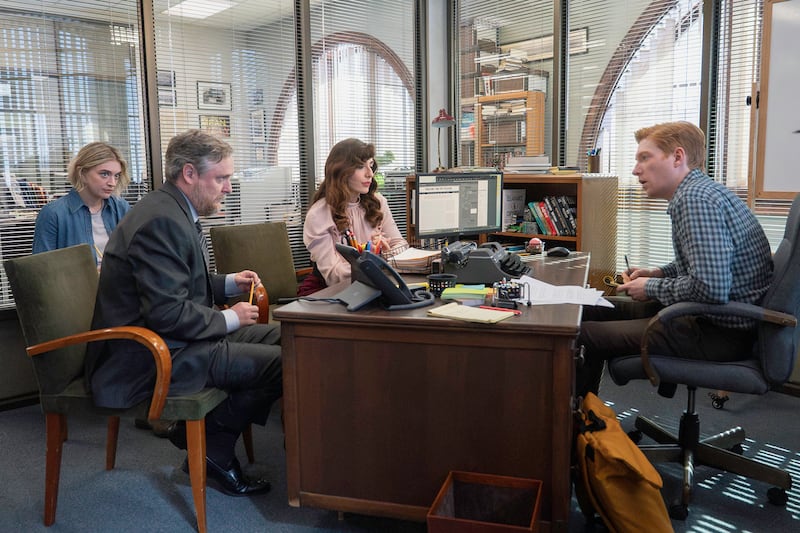
As explained by compositor (and army vet) Mare Pritti (Chelsea Frei), the publication is now a hodgepodge of online AP wire stories and horrid clickbait, the latter of which is produced by its reality TV show contestant-turned-managing editor Esmeralda Grand (The White Lotus’ Sabrina Impacciatore), an ostentatious Italian who’s the epitome of shallow, narcissistic lunacy.
This is a far cry from the Truth Teller’s heyday, epitomized by a black-and-white 1971 documentary about its then-editor John Stack (Tracy Letts), although its fortunes change with the arrival of Ned Sampson (Domhnall Gleeson), a fresh-faced journalist who’s eager to restore the newspaper to its former journalistic glory.
The problem is, The Truth Teller is a dinosaur in a digital age, and it’s owned by Softies, a thriving toilet paper company that shares its office floor. Ned was himself once a Softies salesman, but he’s wholeheartedly dedicated to serious, honest, valuable old-school reporting, enthralled by the basement’s printing press and convinced that he’s going to make a difference for Toledo and the industry.
With the blessing of his boss Marv Putman (Allan Havey), he assembles an editorial team comprised of Mare, ad salesmen Detrick Moore (Melvin Gregg), sports reporter Barry (Duane Shepard Sr.), circulation rep Nicole Lee (Ramona Young), Softies straggler Travis (Eric Rahill), and accountants Adelola Olofin (Gbemisola Ikumelo), Adam Cooper (Alex Edelman), and Oscar Martinez (Oscar Nuñez), the one recurring The Office star, who’s unhappy about being filmed by the same crew that previously trailed him around Scranton.
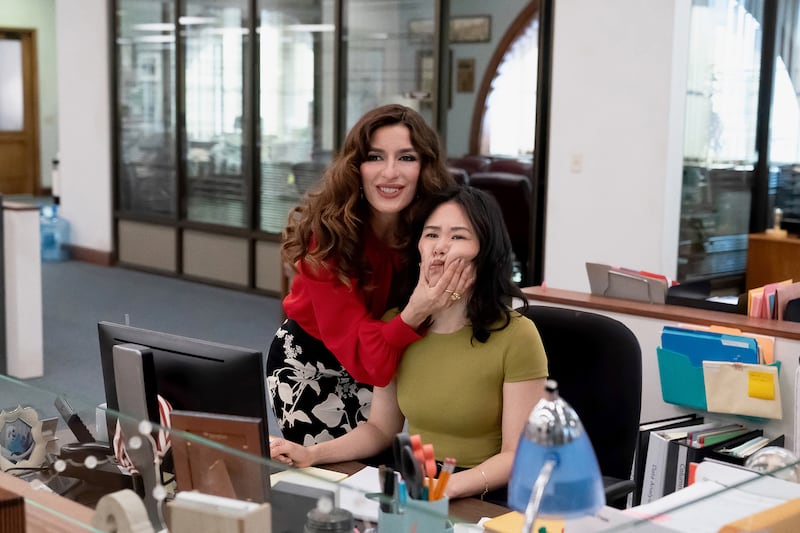
While none of these individuals are cut out for this undertaking, they’re game to try, and they slowly develop into a ragtag team. In the process, they wind up pitted against both troublemaking Esmeralda, who’s jealous of anyone and anything that steals her spotlight, and strategist Ken Davies (Tim Key), a conniving British suck-up and all-around pain in the a– who objects to the company allowing its employees to waste their time on this unprofitable venture. Together, Esmeralda and Ken make for a playfully self-serving duo, even if the material doesn’t totally figure out what to do with them.
The Paper’s characters are a diverse and affable bunch who, at outset, aren’t amusingly distinctive. Ned is fussy and idealistic, Adam is dim-witted, and Barry is perpetually out to lunch, but they’re neither unique office-setting types nor, with the exception of Esmeralda, idiosyncratic comedic creations.
The Truth Teller’s dynamics are similarly flat, largely because they feel so old-hat. In terms of dialogue, editing, and rhythm, the series is just an extension of The Office, and so too is its favorite punchline device: cutting, immediately after a bit of weirdo nonsense, to one person (usually Mare) staring at the camera with a look of ironic bemusement or astonishment—aka, the “Jim Face.”
By hewing to formula, The Paper never comes up totally empty and yet rarely strikes gold, save for those intermittent moments when Impacciatore’s Esmeralda says or does something truly bonkers. Alas, even her madness is a tad strained, and that goes double for Ned’s dorky do-gooder routine.
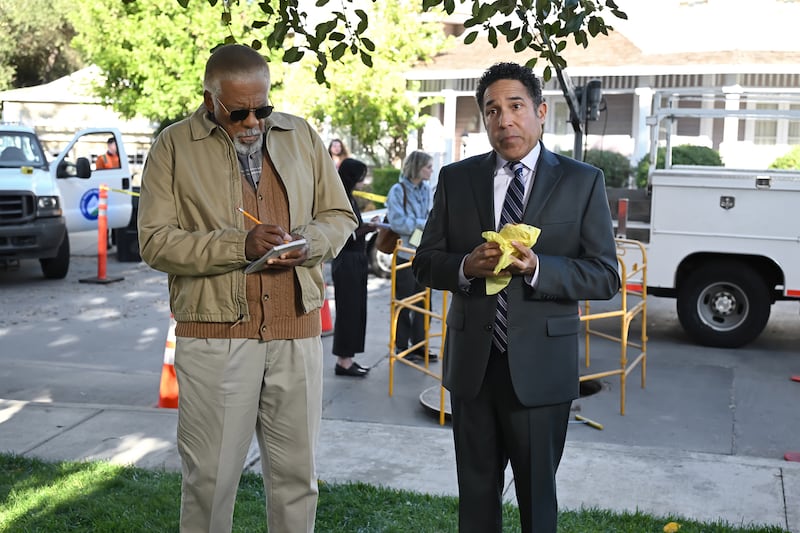
Gleeson is comfortable making a fool of himself and Daniels balances his protagonist’s noble romanticism with touches of ego, anger, and insecurity. Nonetheless, he’s too bland by half, and most of his compatriots lack detail; Barry is a lame one-note joke, Adam and Adelola are borderline featureless, and Detrick, Nicole, and Travis only boast slightly more personality.
All the proceedings’ players, including Ken, elicit a chuckle or two over the course of the series’ 10 episodes. But by and large, they’re genial kooks who pale in comparison to their sitcom ancestors.
The Paper’s storylines often involve the challenges of contemporary journalism, whether it’s the difficulty of maintaining independence in the face of corporate pressure, or the unpleasantness of online trolls who relish the opportunity to point out typos and mistakes in excessively ugly fashion.
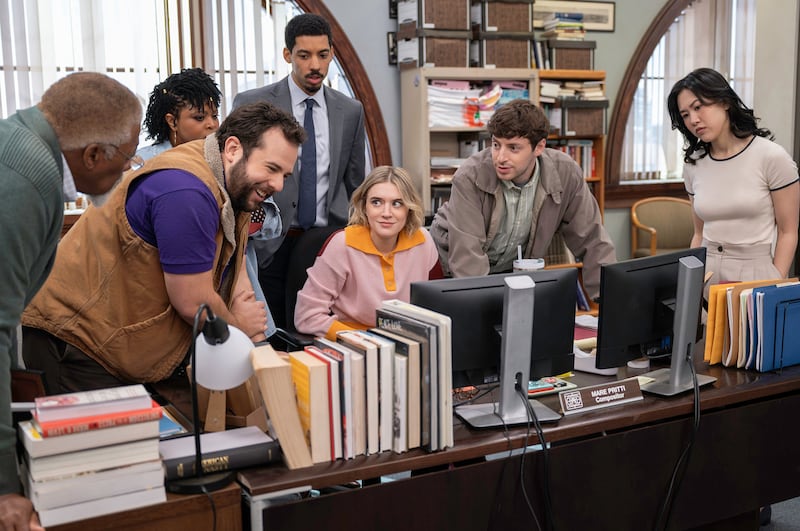
Unfortunately, the show is incapable of doing something loopy or unexpected with those tensions, and it otherwise exhibits little interest in out-of-left-field goofiness. Its attempts at drollness result, unintentionally, in tameness. Gleeson and Frei’s rapport, which seesaws between combative and kind, frequently seems ripe for humor. Yet the placid action’s dialogue is ho-hum, making one long for the days of a choice Michael Scott or Dwight Schrute quip.
Judging The Paper by The Office standards would be more unfair if viewers weren’t reminded, at every turn, of the series’ intrinsic connections, most overtly via Oscar, who spends the entire season protesting the documentarians’ presence.
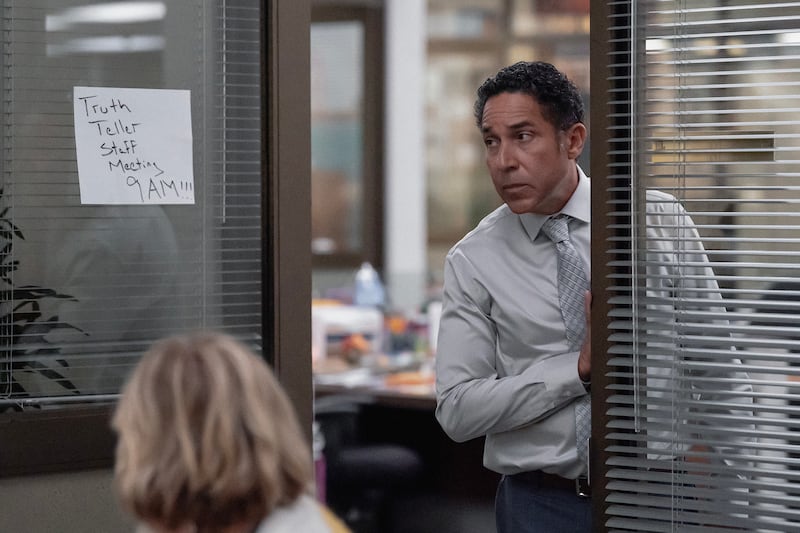
Esmeralda is the sole participant who’s cut from a novel cloth, and her cunning schemes and wonky behavior are elevated by Impacciatore’s flamboyant, messy, and garish performance. For the most part, though, she’s stranded working alongside compatriots whose quirks, hang-ups, and relationships are unremarkable.
Daniels strives for differentiation by avoiding the outrageous cringe humor of his prior effort, but in doing so, he delivers what amounts to a neutered version of the same thing.
To be fair, The Office started out rocky; it didn’t really hit the ground running until its second season, after its characters were fully established and it could employ them for unexpected daffiness. A similar fate is certainly possible for The Paper, which ends on a strong note and lays a reasonably solid foundation for future funniness. To do so, however, will require blazing a new trail rather than merely plagiarizing its precursor’s template.
The post ‘The Office’ Spinoff ‘The Paper’ Is a Disappointing Copycat appeared first on The Daily Beast.




